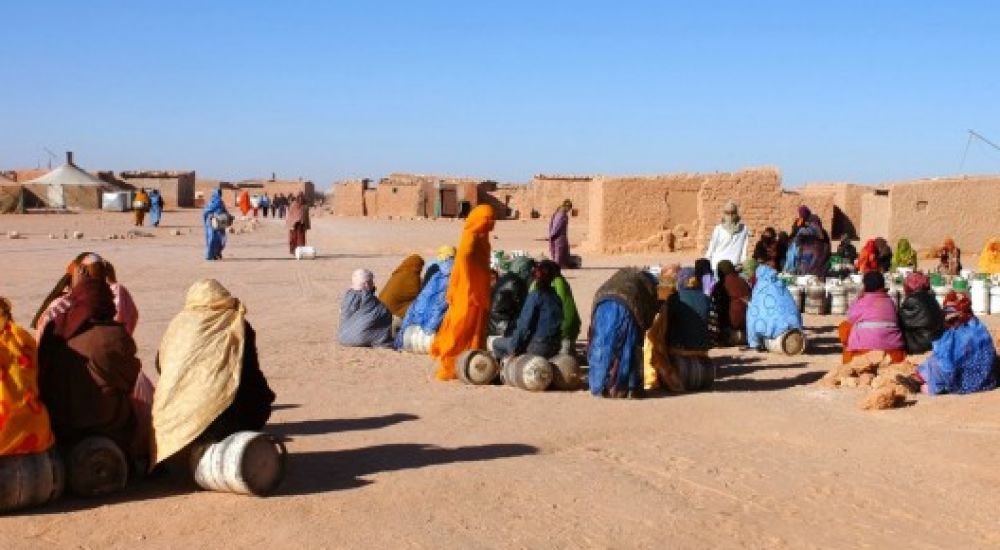The security vacuum in northern Mali endangers the entire Sahel region, Mohamed Ould Abdel Aziz warns.By Raby Ould Idoumou for Magharebia in Nouakchott
![[AFP/Farouk Batiche] Mauritanian President Mohamed Ould Abdel Aziz says that no Libya arms have seeped into Mauritania.](http://magharebia.com/cocoon/awi/images/2012/02/17/120217Feature2Photo1.jpg) [AFP/Farouk Batiche] Mauritanian President Mohamed Ould Abdel Aziz says that no Libya arms have seeped into Mauritania. [AFP/Farouk Batiche] Mauritanian President Mohamed Ould Abdel Aziz says that no Libya arms have seeped into Mauritania. |
Al-Qaeda in the Islamic Maghreb (AQIM) is determined to exploit Mali’s security fragility to stage deadly attacks against Sahel states, Mauritanian President Mohamed Ould Abdel Aziz told Le Monde in an interview dated February 10th.
The north of Mali has been locked in intense fighting between Malian troops and Touareg rebels for over a month. The conflict is a “great concern” and “the outbreak of war creates problems for the entire region”, Ould Abdel Aziz told the French newspaper.
There are two movements pitted against the Malian government, the president specified, the National Movement for the Liberation of Azawad (MNLA) and Iyad Ag Ghali, who “has forged alliances with terrorist groups”.
“The north of Mali is an area left behind and almost free for terrorism. That’s where they stay and it is from there that the terrorist acts and gets paid ransoms that increase,” he added. “These terrorists are on a desert strip of 300 km and they source fuel and food from three or four known cities including Timbuktu and Gao.”
While AQIM numbers do not exceed 300 terrorists, the president asserted, only concerted efforts can help stave off the threat.
Sahel states are linked under joint leadership for combating terrorism. The Tamanrasset military command(CEMOC), which includes Algeria, Mali, Mauritania and Niger, was designed in 2010 to co-ordinate intelligence-gathering in a campaign against terrorism, organised crime, arms smuggling and kidnapping.
Regulations governing the CEMOC work are developed but need to wait to “go concrete”, Ould Abdel Aziz said.
“Any security tension in our region could be cause for deterioration of the situation, and if we let al-Qaeda stay in the region, all areas remain threatened, including tourism and mining,” he added.
Mauritania has been engaged in a war against terrorism for the past seven years and used an array of measures from strengthening checkpoints to sending mobile units to the border areas and carrying out military operations, according to the president.
As a result, “armed gangs are no longer able to carry out operations in the country as they did before”, he said.
Another issue of concern is the proliferation of Libya weapons, which poses fresh challenges to Maghreb security. The possibility of AQIM acquiring these arms is one of them. Mauritania shut its borders in the wake of Libya unrest to prevent the threat.
“Units defending Kadhafi left Libya to Niger or Mali with their weapons. But our borders were already closed,” he said.
In August, Ould Abdel Aziz noted, the Mauritanian air force destroyed a vehicle equipped with a surface to air missile.
The president’s interview was “illuminating”, Mauritanian journalist Mohamed Ould Sid al-Mokhtar said, as it laid bare “the decline witnessed by the terrorist groups and co-operation between the countries of the region in the fight against terrorism”.
For his part, Sahara Media journalist Mohamed Ould Zein credited the Mauritanian president for breaking the silence on Touaregs’ alleged links with al-Qaeda.
“Talking about it frankly has become necessary to enlighten public opinion on the truth of the subject,” he alleged.
Others say that Mauritania could play a more visible role in mediating the conflict.
Related Articles
Loading
“The possible link between Mauritania and the National Movement for the Liberation of the Azawad must be used to encourage sitting down at the negotiating table,” French Minister for Co-operation Henri de Raincourt said during last week’s Sahel tour.
So far, Algeria has made attempts at brokering the conflict. Three days of talks took place in early February between the Malian government and the Touaregs’ 23 May Democratic Alliance for Change, whose elements fought alongside the MNLA.
For his part, journalist Abdallah Ould Atfag al-Mokhtar contended that Ould Abdel Aziz’s interview gave “important assurances” about the issue of Libya arms. The president denied that they had seeped into Mauritanian territory but confirmed that they had reached Niger and Mali.
This calls for further strengthening efforts to counter the effects of the spread of weapons in the volatile and unstable region, according to Ould Atfag al-Mokhtar.



